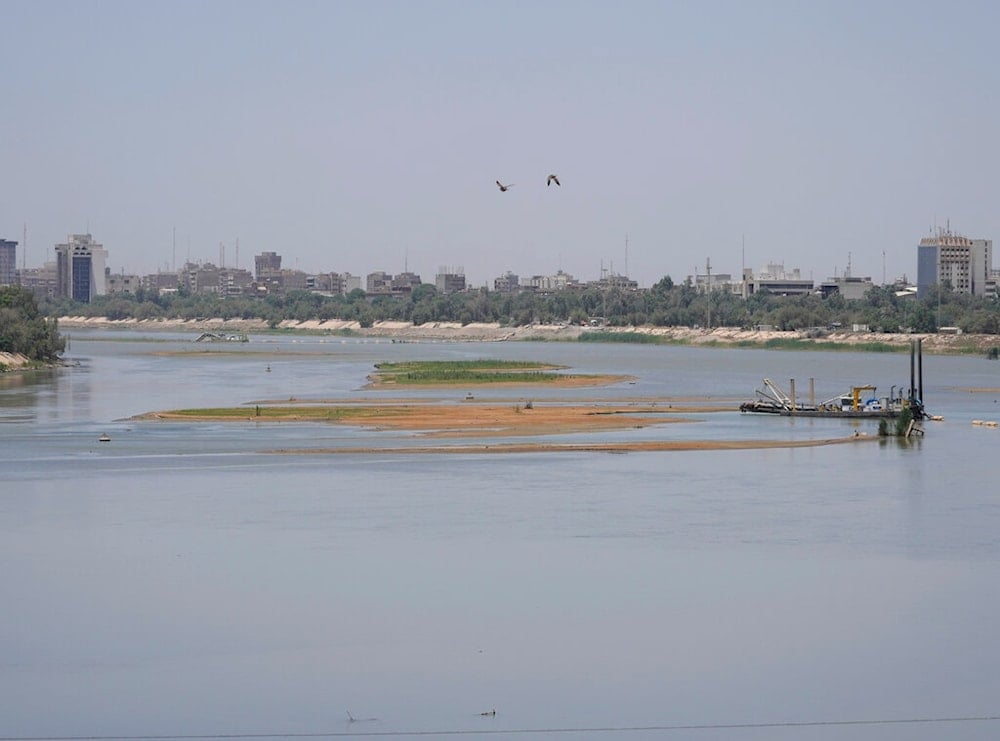Turkey, Iraq reach draft water agreement amid growing drought
Turkey and Iraq move closer to finalizing a water-sharing deal as drought worsens across the Tigris and Euphrates.
-

Significantly lower water levels are seen on the Tigris River, in Baghdad, Iraq, on Saturday, May 28, 2022 (AP)
Top diplomats from Turkey and Iraq announced a draft framework agreement on Friday, October 10, to manage water flows and address declining levels in the Tigris and Euphrates rivers. The agreement, which is expected to be signed soon in Iraq, comes as the region faces worsening drought conditions exacerbated by climate change.
Speaking at a joint news conference, Iraqi Foreign Minister Fuad Hussein confirmed that both countries have reached a preliminary understanding on water sharing.
Turkish Foreign Minister Hakan Fidan acknowledged Iraq’s challenges, stating, “We know and understand the difficulties you are experiencing. We are brothers and sisters in this region. The waters of the Euphrates and Tigris belong to all of us.”
He stressed the urgency of implementing water rehabilitation projects, warning, “This water shortage will continue to be a problem not only today but also for years to come.”
Iraqi officials have long accused Turkey of reducing water flow through upstream dam projects, leaving Iraq with diminished access to fresh water. The Tigris and Euphrates, which originate in Turkey, are Iraq’s primary water sources.
Climate experts warn that prolonged drought and rising temperatures are compounding water insecurity in Iraq.
The draft Turkey-Iraq water agreement aims to coordinate resource management and increase transparency between the two nations, though full details have not yet been released.
Read more: Iraq's extreme temperatures should serve as 'wake-up call': UN
PKK, security, and shifting regional cooperation
The water agreement is the latest sign of improving relations between Ankara and Baghdad, which have often been strained over Turkish military operations in northern Iraq. Turkey regularly carries out cross-border actions targeting the Kurdistan Workers’ Party (PKK), which Ankara considers a terrorist group.
Baghdad has frequently condemned these incursions as violations of its sovereignty, while Turkey accuses Iraq of failing to curb PKK activity.
Earlier this year, the PKK announced its decision to disband and renounce armed conflict. A symbolic disarmament ceremony was held near Sulaymaniyah in July as part of a broader peace initiative with Turkey.
Sulaymaniyah Airport reopens after Turkish flight ban
On Thursday, Turkey lifted its flight ban on Sulaymaniyah International Airport in Iraq’s Kurdistan region. The restriction, imposed in 2023 over alleged PKK activity, was lifted following a meeting in Ankara between Turkish President Recep Tayyip Erdogan and Kurdish Regional President Nechirvan Barzani.
Barzani’s office welcomed the decision, describing it as a reflection of “strong ties between the two sides” and a step toward “deepening mutual cooperation.”
Read more: Bees in Iraq’s Basra threatened by water crisis and declining honey
Turkish Airlines confirmed it would resume flights. “We are delighted to soon reconnect our Sulaymaniyah route with the skies once again,” said company spokesperson Yahya Ustun on social media.
The improving relationship between Turkey and the Iraqi Kurdistan region also includes economic cooperation. Last month, Iraq resumed oil exports from the Kurdish region through Turkey’s Ceyhan port, ending a two-year suspension.
The move followed negotiations between Baghdad, Erbil, and Ankara, which resulted in a shared commitment to revitalize trade and infrastructure links.

 3 Min Read
3 Min Read










